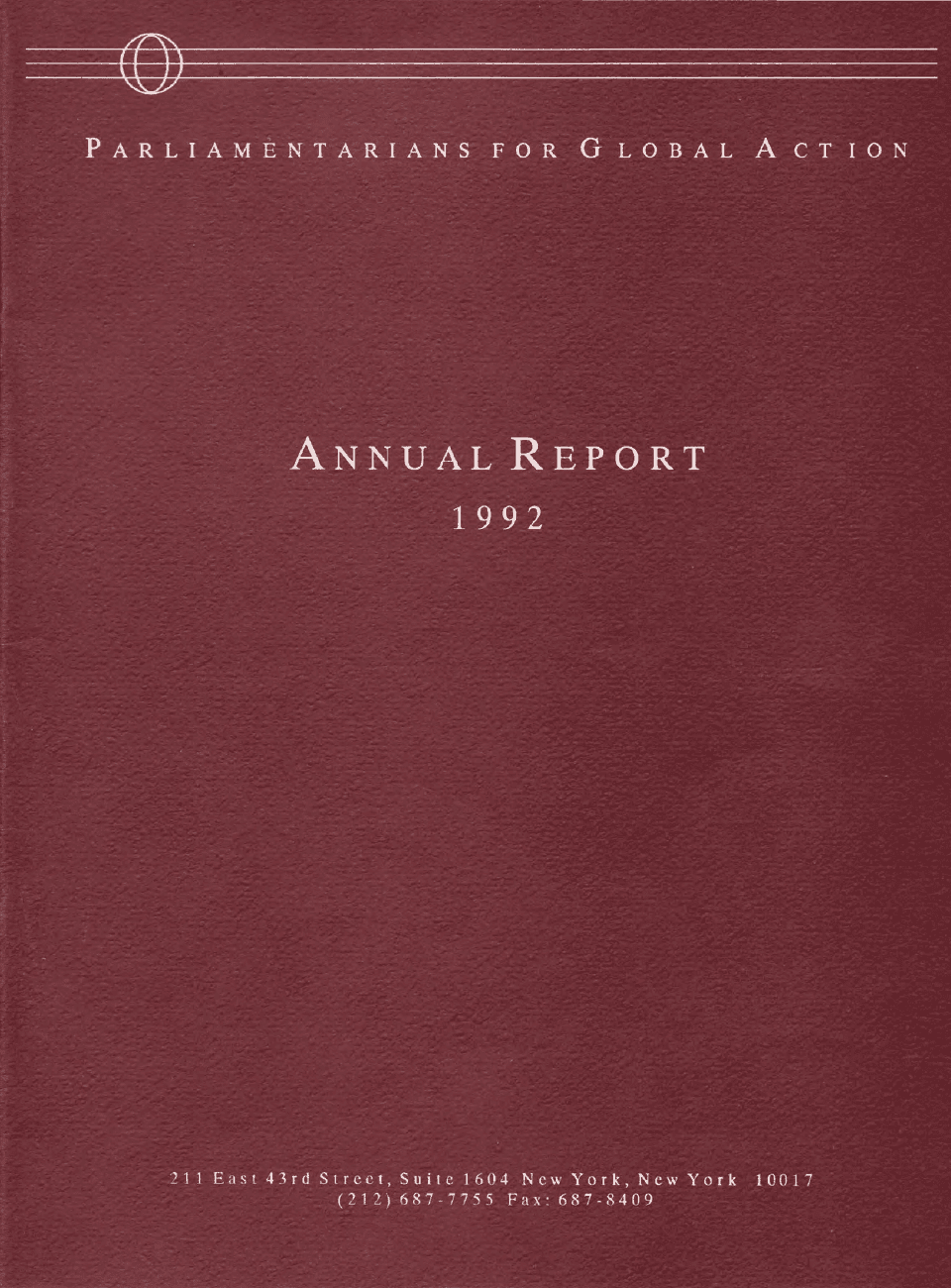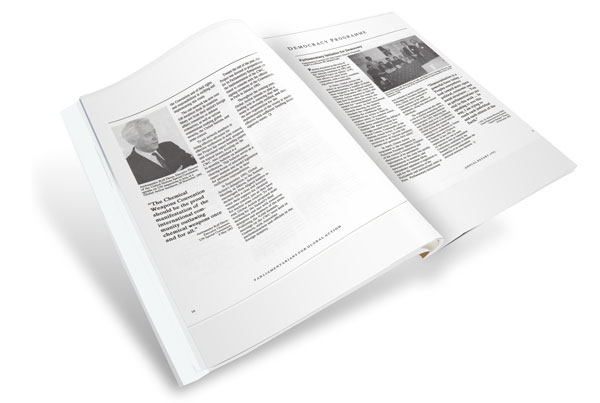Publication

Reporte Anual 1992
1992 proved to be another year of challenge, uncertainty and change in the political evolution of the world community.
Description
1992: Towards a Global Security System
It is by now clear that the early 1990s will be seen as a major period of transition from one era of international relations to another - from the forty-year period of the Cold War to a post-Cold War era whose norms and structures are not yet clearly defined. 1992 proved to be another year of challenge, uncertainty and change in the political evolution of the world community.
We are witnessing, in the final decade of the century, a quickening pace of change in the structur.e of human societies and the relat10ns between them. The historical correlation between sovereignty and the nation-state is beginning to loosen: global and regional executive powers are strengthening over issues such as law and order, while administrative authority over cultural rights is devolving into smaller autonomous units of appropriate ethnic scale. Sovereignty, in short, is being stretched both ways, with the nationstate moving toward a less preeminent position in the hierarchy of human affairs.
With the end of the Cold War, the international system is transforming from the age-old balance of power, perhaps toward a true collective security system centred on the United Nations. The immediate benefit for the world is the release from the political psychosis of fear and mistrust that had haunted nations and peoples in recent decades, and the beginning of a serious move toward nuclear disarmament. During the year, the first-ever UN Security Council Summit declared the proliferation of weapons of mass destruction to be a threat to the peace, opening the way for a more assertive approach by the Council to the disarmament obligations of member states. By year's end, the negotiations culminating in START II brought the question of minimum deterrence within the range of political credibility. The various moratoria on nuclear testing augured well for the continued viability of the nonproliferation regime. The completion of the Chemical Weapons Convention was a major step forward for humanity, not only for its intrinsic arms control merits but also for its unprecedented verification provisions. And the introduction of a conventional arms transfer register at the United Nations heralded new advances in confidence-building in an area where progress has hitherto been unacceptably slow.
Through 1992, the United Nations moved further centre-stage in the efforts of the world community to prevent and control conflict. The Security Council Summit agreed that "the world now has the best chance of achieving international peaee and security since the foundation of the United Nations" and stressed "the inportance of strengthening and improving the United Nations to increase its effectiveness." The landmark Agenda for Peace, presented by the UN SecretaryGeneral, offered creative proposals for strengthening the Organisation's capacity to be effective in maintaining the peace. New concepts and principles were put into practice, such as UN humanitarian intervention in Somalia, and preventive deployment in Macedonia. The United Nations stands today as the vehicle through which the major powers can properly exercise their primary responsibilities in this area. Yet the opportunity for the United Nations was matched by the severity of the problems member states faced in providing sufficient resources to the Organisation for it to take on many of the world's crises simultaneously. Member states have yet to prove equal to the real challenge of the 1990s.
The move towards a collective security system presumes a civil society at the global level. The initial indifference to human plight in Somalia during 1992 challenged the conscience of the world community, and the atrocities committed in the Balkans banished any notion that humanity had seen the last of such behaviour earlier this century. The need for individual accountability for criminal acts under international law has never been more pronounced. A breakthrough was made in 1992 with the mandate accorded by the General Assembly to the International Law Commission to draft a statute for an international criminal court. Earlier in the year, the UN Secretary-General had called, in Agenda for Peace, for all member states to accept compulsory jurisdiction of the International Court of Justice by the year 2000.
An important source of conflict in the world remains the growing disparity in wealth between rich and poor countries. The promotion of sustainable economic development with social justice is not only critical to effective peacemaking and peacekeeping, but it is an essential condition for the attainment of universal human rights, democracy and a protected environment. The failure to complete the Uruguay Round of the GAIT in 1992, and the continuing strains in trade relations among the major economic blocs and between North and South, comprise the main systemic weakness of the international community.
With the increasing importance of the United Nations in world affairs, the question of UN reform attains a heightened importance.
Many underlying political issues concerning the Organisation - Security Council membership, the use of the veto, the relationship between the United Nations and specialised agencies, the relative powers of the Security Council and the General Assembly, the creation of a competent environmental body - surfaced in 1992. The 47th General Assembly resolved to have Member States "submit not later than 30 June 1993, written comments on a possible review of the membership of the Security Council" and to have the Secretary-General submit a report containing these comments for consideration to the 48th session of the General Assembly in 1993.
The 50th anniversary of the United Nations in 1995, for which preparations have already commenced, could become a focal point for decision in this respect. An emerging issue, not yet on the agenda of the international community, is the role which parliamentarians - the representatives of the peoples in whose name the UN Charter is written and who give it a continued legitimacy - might have in deliberating upon UN affairs.
During 1992, Parliamentarians for Global Action strengthened its network of politicians - from 648 to 864 members - working co-operatively across national and party lines on global issues. More than anything else, Global Action is a cadre of legislators committed to developing political support for the United Nations. We believe fundamentally that the people who elect us - and who have the inalienable right to hold our actions accountable - fervently desire peace and harmony around the planet. Under the Charter, governments represent the states that comprise the membership of the United Nations. The 179 member states, as at December 1992, pursue 179 separate national interests which, in their conception and prosecution, are often competitive and occasionally in conflict. As parliamentarians, we actively seek, in a manner freer than officials, to harmonise our national policies through a vision that transcends, yet remains compatible with, the national interests of our countries.
Membership of Global Action is individual, and derives thus from a personal commitment to the "planetary interest." This Annual Report identifies the programme objectives and political goals our members pursued to that end during 1992. As politicians drawn from all philosophical persuasions we have differences among ourselves over certain partisan issues. But we stand united over a higher set of principles that reflect an emerging new philosophy relevant to the politics of the age.
These are:
- democratic structures with "free expression, and free and fair elections, in each of our countries;
- observance of the rule of law, and the pacific settlement of disputes among our countries;
- an effective UN collective security system for the prevention of conflict, or its control through the judicious use of force through the Security Council;
- an effective system for the regulation of armaments by the United Nations, including an end to the production and deployment, and the eventual elimmation of nuclear weapons from national arsenals, as the sole remaining weapons of mass destruction not prohibited in international law;
- a decent human respect for the beauty and bounty of the planet, in which the sustainable development of its resources, for an optimal global population, is consistent with environmental integrity and a concern for the interests of future generations;
- a global economy with open commercial regulations and financial stability, in which the least developed nations are assisted to a minimum standard of living based on agreed notions of social justice for all of humanity;
- a universal respect for human rights and their effective compliance by all nations, including the free exercise of the rights and responsibilities of parliamentarians.
These "principles of global politics" - democratic structures, the rule of law, collective security, regulation of armaments, sustainable development, economic equity and human rights - inspire Parliamentarians for Global Action in its work. We commend them and our work to you, and look both for your support and co-operation in together attaining the goals for which we strive.
Sen. Silvia Hernández (Mexico)
International President
PDF(s)
Additional Details
- Tipo de publicación: Annual Report
- Fecha de publicación: 01 February, 1993
- Autor/es: Parliamentarians for Global Action



